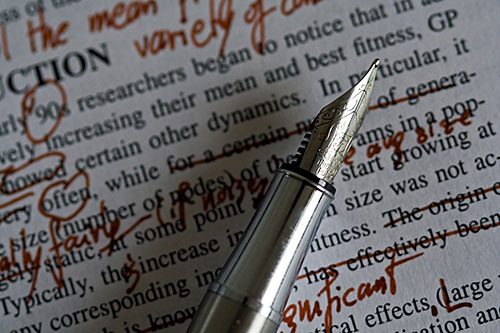What tone to use when writing a letter to an author or making queries on their manuscript is often one of the most crucial yet most challenging parts of an editor’s job. There are many factors to consider: Where are you at in the editing process? Are you speaking to the author directly, or are you addressing a senior editor? Is this the author’s first novel, or are they more experienced? With so many factors to juggle and so many tiny nuances, it’s no surprise that this is the area that trips up most novice (and sometimes more senior) editors.
When you are addressing an author that is new to the editorial process, a more gentle tone is worth considering. Because they are not used to how the publishing industry works, it sometimes comes as a surprise just how much change their novel goes through during the editing process. Establishing a good relationship with the author is always recommended no matter where they are in their career, but in the case of a new writer, it provides reassurance that their novel is in the hands of someone who cares about it and wants it to succeed. That’s not to say that more experienced authors don’t appreciate this as well—after all, authors that have proved themselves often already know what good editing is, so if you write something that offends them they can easily move on to a new editor. Having an open line of contact with the author prevents miscommunication and allows them to express any questions or concerns that they might have. If you are in either the developmental or line-level editing phases, don’t be shy about also pointing out where the novel really shines. This not only gives the writer confidence, but it highlights the areas of their novel that they should emulate throughout their writing.
There is an important line to walk when you are being considerate. You do not want to come across as too harsh, but it is equally important to convey that you are sure of yourself. You need to project confidence in your skill so that the author has confidence in you. Sometimes when editors are trying to be careful with their phrasing, they start to write queries with so many qualifiers that they look confused. “I’m not sure,” they write, “but I think this sentence might be too long. Maybe rephrase it?” Do away with some of the qualifiers, and avoid saying you aren’t sure of something.
There are times, however, when the tone you use is expected to be slightly different. Sometimes editors are working for managing editors, and the notes that they make are not for the author. Notes for an editor are expected to be more direct in order to help them quickly pinpoint problem areas and look for solutions. But in the case that the author does not see your comments, you are still expected to be polite. You never know what might get back to them, after all. As a general rule, take the time to reread everything you’ve written whenever you’re giving editorial feedback. How would you feel about receiving this feedback about a project that is incredibly important to you? If what you’ve written gives you pause, then your answer is clear—it’s time to reword your edits in a more tactful way.

